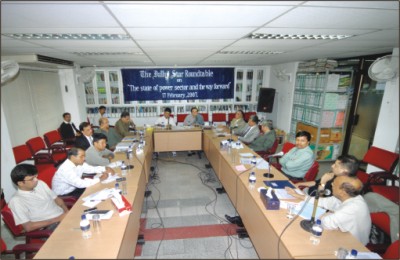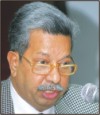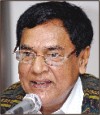
The state of power sector & way forward
A round table on, " The state of power sector and the way forward," was organised by the Daily Star on 17 Feb 2006. It was participated by professionals, subject experts, academics, and members of the civil society. The Editor of The Daily Star, Mahfuz Anam, moderated the discussion. The transcript of the discussions is published below.

Mahfuz Anam
On behalf of the Daily Star I welcome you all to the roundtable.
We want this discussion to be in-depth and interactive. It's a technical subject. We shall endeavour to look at the problems and find ways as to how to overcome them. Power sector problems have been thoroughly discussed in various forums and also covered in the media. Today there is a caretaker government in power. There are some immediate decisions that are to be taken. You know very well that the result of a decision comes after many years. Therefore there is not a moment to lose. At the moment load shedding ranges between 2000 and 2500 MW. The internal growth of demand for electricity is increasing by 10% annually as a result demand will exceed 5500 MW this summer against a supply of 3300 MW. There is a shortfall of 2500 MW. And it is likely to rise in the near future.
Basically, we would expect a direction from you regarding how we can overcome the problems. So, let this be an interactive session. I would now like to invite Sharier Khan of The Daily Star to make his opening remarks.
Discussion
Sharier Khan
 From my 15 years of experience as a journalist I have observed that if the political leadership in Bangladesh wants, then anything that is near-impossible can be made possible. Its best example is in this country. Because of corruption no project gets completed in time and there is cost escalation which goes against national interest. But there is an example of one project being completed in time, and it did not go against the interest of the country. I have heard the power secretary arguing with some donors saying that it is not possible to implement a project with transparency. But we have seen some private power projects like Meghna Ghat, Haripur etc. There were debates and arguments between power companies and the relevant negotiating authorities but in none of the cases was there any instance of re-tendering. All of these projects, as old as eight years, are running well. When private power projects were being implemented public sector projects were having different types of problems. But today we are talking about the success stories. We have seen that even though we have examples of success before us, after 2001 private power projects began to close down and experienced people in the sector were sidelined. We don't know whose interest it served. In the end, the problems have brought us to the situation we are facing now. The element of dishonesty in the whole deal made some people rich, but there was no gain for the country. Therefore it is true that if there is honesty then any power project, however big it may be, can be implemented within 3 to 4 years. It is possible in Bangladesh. Some of those who were behind the success stories are present here today.
From my 15 years of experience as a journalist I have observed that if the political leadership in Bangladesh wants, then anything that is near-impossible can be made possible. Its best example is in this country. Because of corruption no project gets completed in time and there is cost escalation which goes against national interest. But there is an example of one project being completed in time, and it did not go against the interest of the country. I have heard the power secretary arguing with some donors saying that it is not possible to implement a project with transparency. But we have seen some private power projects like Meghna Ghat, Haripur etc. There were debates and arguments between power companies and the relevant negotiating authorities but in none of the cases was there any instance of re-tendering. All of these projects, as old as eight years, are running well. When private power projects were being implemented public sector projects were having different types of problems. But today we are talking about the success stories. We have seen that even though we have examples of success before us, after 2001 private power projects began to close down and experienced people in the sector were sidelined. We don't know whose interest it served. In the end, the problems have brought us to the situation we are facing now. The element of dishonesty in the whole deal made some people rich, but there was no gain for the country. Therefore it is true that if there is honesty then any power project, however big it may be, can be implemented within 3 to 4 years. It is possible in Bangladesh. Some of those who were behind the success stories are present here today.
I believe if a good plan is taken and efforts are given to implement that then the shortfall of 3 to 4 thousand megawatt can be easily handled.
Mahfuz Anam
We have a positive mindset today. We have self-confidence and we believe that we shall be able to do it, assuming that this government has the determination to do it. Let us see what recommendations we can put forward before the government so that it can solve the power sector problem in an effective and transparent way. I now request the immediate past State Minister for Power Maj. Gen. Anwarul Kabir Talukdar to make his statement.
Maj. Gen. Anwarul Kabir Talukdar
 Today we are keen to talk about the positive side. We may talk about problems the whole day but if we do not talk about directions, as to how these problems can be solved, the discussion will have no meaning. It is also true that a doctor has to diagnose the patient accurately before prescribing medicine, otherwise the disease may come back after seven days.
Today we are keen to talk about the positive side. We may talk about problems the whole day but if we do not talk about directions, as to how these problems can be solved, the discussion will have no meaning. It is also true that a doctor has to diagnose the patient accurately before prescribing medicine, otherwise the disease may come back after seven days.
In every activity leadership is very important. In a government political leaders give that leadership. Therefore success or failure will depend on leadership.
Electricity is a highly technical and complex technology. Here leadership has to be given jointly by the political and technical people. There is no scope here to undermine the role of one another. Because, the electrical and mechanical engineers have the knowledge and expertise, on the other hand there is the political leadership with a vision and commitment to the country and to society to take it forward. The spectrum of the vision of the political leaders has to be broader. But unfortunately we have seen that there was lack of both, there was crisis of both.
The technical experts could not give correct advice, similarly political leaders also could not do it. The leader, be it the state minister for power, is the team captain. If the team captain is lacking in his leadership ability, and personal character, then there would be disaster. In that case the experts under him will not be able to do much.
In my view the reasons of today's problems in the power sector are -- inept leadership for many years, especially in last five years during the tenure of the post government. There were shortcomings among the experts as well. Then there is the issue of power infrastructure to ensure uninterrupted supply of electricity and its quality. There are many weaknesses in the infrastructure. There are organisational weaknesses too. These have to be overcome. There have to large-scale reforms. There is a power sector reform master plan but that is only in paper. There is no drive to implement it to meet the need of the time. This is needed for our industrial and agricultural development.
Then comes the issue of corruption. It is unfortunate that many of us have been engulfed by corruption. Now what is the solution for corruption? If the top person of the organisation is honest, upright, and has commitment to the nation, then 80 percent of corruption can be routed out. As far as the remaining 20 percent, many other areas have to be addressed, because power sector is not an isolated island. It is very much a part of this society. Therefore, if all the other root causes of corruption can be removed, then the remaining 20 percent can also be removed. I feel if at least 80 percent of the ministers in a cabinet remain above corruption then 80 percent of the secretaries will also be above corruption. Similarly, officials below him and the departmental head, that is the chairman of Power Development Board, is free of corruption, and if he has dynamic leadership, then my assumption is that 80 percent of the people involved will behave rationally -- in other words, will not involve in corruption.
Now, the question of trained manpower. The former PDB chairman who is sitting here had told me that for the last ten years there has been no recruitment. In an ongoing process every year people will go on retirement or go on deputation. But there has to be a process to fill up those empty posts. I failed to comprehend why there was no recruitment for many years. As a result, today it has become almost a daunting task to find a good chairman for PDB or Board Members.
In other areas also there is dearth of competent people. Competent people also do not get proper patronisation. You have to give incentive to competent people. Competence has to be evaluated. A distinction has to be made between good and bad. A good man has to be rewarded and a bad man punished. There is no such practice in this sector. In my four-month tenure in the power sector I have visited almost all the places except two or three. In some places some officials did not like my unannounced visit. In one place I asked the officials to show me the accounts of income and expenditure. None could show me the balance sheet. They were looking at one another. Then the relevant official told me there was a loss of 6 to 7 crore taka. But I calculated a loss of at least Tk. 50 to 60 crore. It was the plant at Raujan. We took a decision over there to the effect that in every power plant a balance sheet has to be maintained. But in every step that I took for the welfare of the country I faced obstacles.
I want to mention one more thing. The power plants are in operation for many years now. But no gas purchase agreement has been signed till date -- between the power station and the gas company. What is the reason behind this? I gave a deadline of 30 days to submit a report to me. Unfortunately, I could not succeed for various reasons. As for autonomy, of PDB, I noticed that every file comes to the ministry -- unnecessarily. My opinion is, I shall give the official concerned a charter of duties -- there would be an understanding that he would produce this much electricity and at the end of the month we would like to scrutinise his balance sheet. After that I would monitor the work in different ways and methods. But you will be surprised to know that some teachers of BUET along with some of their students developed a software that would enable anyone with a mobile phone set with internet connection to learn what power station is producing how much electricity. So far this is being done in a primitive way through telephone. If the person is interested to know more, then with the help of the mobile phone can learn how much input is being given by which feeder of DESA or DESCO. The BUET team demonstrated this before me. I wanted to introduce this but I could not do it. At that time people expressed their surprise that how could such a huge work be done at a cost of only Tk. 10 or 12 crore. According to them it should cost Tk. 300 to Tk. 400 crore if brought from abroad.
Next I would say that there is lack of coordination between the donor community and us. Either it is intentional or it is because of lack of knowledge. We have to take offers from the donors keeping the national interest above everything.
I have a short prescription. We are mainly dependent on gas for running our power plants. Non-technical loss i.e system loss, which in plain words is theft, has to be reduced. At present this is between 16 and 19 percent. It is possible to bring it down to 10, by taking drastic measures, within a period of 3 to 4 months. This will give us 200 mw. You will be astonished to learn that a report has been prepared at a cost of Tk. 3.5 crore but that report was never placed before me in four months. I have no idea what recommendations the committee had put forward in that report to improve the situation. I would like to suggest that if we install capacitors then the system will be upgraded and power output will increase by 100 mw. It is possible to do this within three weeks.
We can also use energy saving valves and save about 100 mw. As for maintenance of de-rated power stations, thousands of crores have been spent but maintenance has not been done in a systematic way. I can mention a project proposal that was taken up by DESA and after a little probing I found out that the entire proposal was prepared by collecting data over telephone. The project cost was some 100 crores. My opinion is, if we can do technical auditing by an independent body then we can learn about the status of each and every machine. We shall be able to decide then what is to be done about that machine and how much it will cost. We have spent thousands of crores of taka in last ten years, then why should output go down?
I want to tell you about a pre 1971 project at Karnaphuli Power Station, No. 3 unit. A proposal came to me to do overhauling of the unit at a cost of Tk. 170 crore, which would result in getting an extra 15 mw of electricity. I found out that by spending Tk. 150 crore I could install a brand new unit and get 50 mw. I sent the note to the authorities but they kept insisting on repairing the old unit at a cost of Tk. 170 crore. But as long as I was there I did not let it happen. All my notes in this regard are self-explanatory and are on record. I want to talk about the 4 and 5 units of Kaptai, which were under repair costing 7 to 8 crore taka. A component had broken down. The contract was drawn in such a way that it could not be completed in one go. At that moment another project costing Tk.160 crore was sent to me. Marubeni was the sole contractor. I wrote back to the ministry that some repair work was being done at that moment so let us observe the matter for six months. I discussed the issue with JBIC president. My idea was that if the repair work is done properly then it should run smoothly for a long time. But my higher authority told me that the 160 crore-taka project has to be undertaken. I told them that we have just spent crores in repair work so we shall go for the new project only when it will become essential. My suggestion was to observe for six months how the repaired unit functioned. I can say that in this case also honesty and commitment were missing at the top level.
As for rental power, according to this system power stations will purchase electricity from contractors for a period of 5 to 15 years. But PDB Chairman told me not to go ahead with the idea because under this system PDB will have to pay subsidy. My calculation was in 15 years the government would have to pay around Tk. 4000 crore as subsidy.
Many people talk about the necessity of tackling emergency situation. My answer is, there are better ways to face emergency. We may tell the FBCCI leaders to set up 1 to 10 mw small power plants. We shall not supply electricity during peak hour and we give them six months time. We shall give them all facilities as per IPP. In that way these units would become self-reliant as far as electricity is concerned within six month. From there PDB can purchase the unused electricity. We could purchase 200 to 300 mw within fifteen days. The unused electricity is lying idle with various industrial concerns such as fertiliser companies. We can buy it at very cheap rate. And people are ready to sell it to the government. But a vested group is working against it. They are in favour of rental power station. They would suck the blood of the people of this country. They are not interested in small power stations. I feel the government should immediately encourage the entrepreneurs with IPP facilities and bank support. If it is done I feel a large capacity building up would be possible in six months.
Next is load management. According to my own calculation we can increase about 200 mw through better load management. We can get 100 mw from recycled energy. With the garbage of the city we can generate 50 to 100 mw electricity. We don't need gas, neither we need to burn our coal. These should be kept as strategic reserves. On the other hand we do not know what is being done with the garbage.
My last point is reform activities. As far as theoretical work of Bangladesh is concerned it is as good as that of America. But unfortunately when it comes to implementation we are at the bottom rung.
Nuruddin Kamal
 It was one hundred years ago that electricity first came to Bangladesh. It was in February 1907. The most important aspect is the vision and commitment of a political government for this sector. Between 1991 and 1996 there was a demand of 200 mw yearly, so in five years it was 1000 mw. When the new government took over in 1996 they found a shortfall of 590 mw. They knew that they will have to increase production from 1800 to 2000 MW. From 1996 to 2001 the requirement was 1250 mw at 250 mw per year. Against that what was available was 1750 mw. Then came private power plants. From 2001 to 2006 demand was calculated at 400 mw yearly, that is 2000 mw in five years. Against that only one plant was put to operation of 80mw capacity. It is not running at the moment. This is the background of power crisis. It is unbelievable that a government in five years could not add more than 80 mw. If we think of a solution keeping the background in mind I think in the beginning two or three mandatory decisions will have to be taken. Almost 85 per cent of the power plants are located in the eastern zone of the country, and only 15 percent in the western zone. But as per population, users and their demand, it should have been in the ratio of 55 to 45.
It was one hundred years ago that electricity first came to Bangladesh. It was in February 1907. The most important aspect is the vision and commitment of a political government for this sector. Between 1991 and 1996 there was a demand of 200 mw yearly, so in five years it was 1000 mw. When the new government took over in 1996 they found a shortfall of 590 mw. They knew that they will have to increase production from 1800 to 2000 MW. From 1996 to 2001 the requirement was 1250 mw at 250 mw per year. Against that what was available was 1750 mw. Then came private power plants. From 2001 to 2006 demand was calculated at 400 mw yearly, that is 2000 mw in five years. Against that only one plant was put to operation of 80mw capacity. It is not running at the moment. This is the background of power crisis. It is unbelievable that a government in five years could not add more than 80 mw. If we think of a solution keeping the background in mind I think in the beginning two or three mandatory decisions will have to be taken. Almost 85 per cent of the power plants are located in the eastern zone of the country, and only 15 percent in the western zone. But as per population, users and their demand, it should have been in the ratio of 55 to 45.
I think for the next five to seven years there can be a mandatory government decision to the effect that no new power plant will be set up in the eastern zone. In that case we can set up 3000 mw power generation plants in the next three years. There are 70 rural electrification 'sameetees'. If each is allowed to generate 20 mw then we will have 1400 mw. This can be done in two years. In the western zone, from Khulna to Dinajpur, some areas have been identified. If we set up power plants at ten areas, each of 100 mw capacity, then it can immediately give 1000 mw and later about 1500 mw. As for captive generation, at this moment installed capacity is 6475 mw in the country - 5275 mw plus 1200 mw (captive generation). We can easily get 200 mw from this 1200 mw, at a cheap rate.
Personally, I am against rental power. I think this subject should not be discussed at all because it will only harm the interest of the country.
Mahfuz Anam
Would you kindly give a clear definition of rental power?
Nuruddin Kamal
The barge-mounted power plants are rental. But the nature of this rental is different. In this system the cost of generation will be high and unit cost will be high -- somewhere around Tk 12 to 14 as opposed to barge-mounted plants which is about Tk 2.30 to Tk 3. But with rental power we have to sign an agreement for 15 years.
In 1997 we had gone to India as a delegation. There was a discussion on the possibility of buying electricity from Farakka. They had 400 MW as surplus. Asian Development Bank was ready to finance the project. I believe they are ready even now. This is a possibility. The private power policy was drawn in 1996. Then there was small power plant policy. But all these were kept under lock and key in last five years. This issue should be discussed and reintroduced. With the assistance of Summit Group we got the first private sector power plant in Khulna. It took only about ten to eleven months to commission the project. Time is very important today.
System loss is basically theft. If this can be stopped then a substantial amount of saving can be done. Government claimed that there is 300 to 400 mw system loss, but I feel it is about 500 to 600 mw. If we can stop 50 percent of the theft then we can have about 300 mw.
I feel two separate transmission systems should be evolved - one in the eastern and the other in the western zone. In that case blackout would not engulf the entire country. Between 1990 and 1997 there were blackouts on 12 occasions. But we have gradually come out of that situation.
The Power Development Board is still under a centralised control. If the decentralised system like REB is adopted then a scenario can be developed.
Dr. Hasan Mansoor
 You have talked about commitment of the political government. If we criticise the political governments then no political government will feel encouraged. After the Awami League government came to power they had generated 1874 MW electricity in five years. All the agreements were done in a transparent manner. Another agreement was done at the fag end with Barapukuria electricity plant project to produce 250 MW in two units. It was a 200 million dollar project in 2001. It was implemented in three years. But when I went to visit the plant the cost was shown as 209 million dollar. That means 9 million dollars was added soon after the signing of the agreement through corrupts means.
You have talked about commitment of the political government. If we criticise the political governments then no political government will feel encouraged. After the Awami League government came to power they had generated 1874 MW electricity in five years. All the agreements were done in a transparent manner. Another agreement was done at the fag end with Barapukuria electricity plant project to produce 250 MW in two units. It was a 200 million dollar project in 2001. It was implemented in three years. But when I went to visit the plant the cost was shown as 209 million dollar. That means 9 million dollars was added soon after the signing of the agreement through corrupts means.
About 90 percent of the power plants in the country are gas based. Now we have to consider the status of gas supply in the country. A power plant usually remains operational for 30 years. Therefore if we cannot supply the required amount of gas then it would not be feasible to set up those plants. The Barapukuria power plants have been set up on the basis of availability of coal in the area. The mine would produce about 3000 tons coal daily and 70 percent of that would go to the power plants. But since coal production came down, one unit of the power plant had to be shut down. If the coal mining process is not developed and constant supply is ensured then no coal-fired unit will have any guarantee of running smoothly.
Sangu's production has stopped and as a result all industrial units dependent on Sangu gas will also close down. It is the same with Bakhrabad. If compressor is not installed in Bakhrabad then there will not be the required pressure in centre grid. Therefore before setting up a plant supply of raw material has to be ensured. In most of the countries power plants are coal based. In the northern zone all power plants should be coal based but the method of mining coal has to be modernised. Open pit mining should be further developed.
Mohammad Aziz Khan
I have the privilege to be involved in the generation of about 200-mw electricity in the private sector. In my opinion, to go forward we have two challenges before us. The first one is the philosophical challenge. The government or the state controls the entire infrastructure in Bangladesh, including electricity. We have moved towards free market economy. According to the principles of free market economy governments have to accept the fact that business will be conducted by the private sector. But this did not happen during the tenure of the past government though private sector power generation policy was taken up in 1996. Unfortunately this policy was not implemented properly. That's one philosophical challenge.
 The other philosophical challenge is, it seems whosoever is in power, including the present caretaker government, wants solution within three to six months of the start of a crisis or a problem. But there is no solution in six months. Be it rental of any other thing there is no solution. Electricity is a challenge that cannot be solved in six months. Both the past government and the present caretaker government may want it but that is only to gain political advantage. Therefore, they fail to see the long-term solution or real solution of electricity crisis. Those two challenges need to be addressed.
The other philosophical challenge is, it seems whosoever is in power, including the present caretaker government, wants solution within three to six months of the start of a crisis or a problem. But there is no solution in six months. Be it rental of any other thing there is no solution. Electricity is a challenge that cannot be solved in six months. Both the past government and the present caretaker government may want it but that is only to gain political advantage. Therefore, they fail to see the long-term solution or real solution of electricity crisis. Those two challenges need to be addressed.
Then the practical solution. What can we do in the coming days? Bangladesh is in a privileged position. It has gas - the cleanest fuel to generate electricity. It needs to be connected from north to south of the western region. We have fixed stock across Bangladesh. The other thing we need is customer. We have customer in every step. Electricity consists of generating, transmitting and distribution. Today generation of electricity is not rocket science. There is no problem in the electricity sector. The problem is in the implementation, in the issue of governance, how do we allow the private sector operate in the free market economy. Then there is a comprehensive document called power sector master plan updated in June 2006. This document gives details.
We have a current shortfall of about 2000 mw. By 2011 the shortfall will be 5000 mw if we do not add any more electricity. From today the people of Bangladesh need to think how by 2011 we will have 5000 mw, how that will be transmitted and how that will be distributed. And how that will be done in a most cost effective manner.
In the last five years there has not been much addition to generation capacity. Therefore, instead of 2500 mw in the coming five years, we have to add 5000 mw. That would require about 3.5 billion dollars. The challenge now is money. How do we get it? There can be public-private partnership, private sector investment, larger combined cycle power plants as well as distributed power. All these are necessary if we are to implement 5000 mw in next five years so that in 2011 we can say that we have a balanced power system. I have found ADB very enthusiastic. The whole world wants to give fund to the electricity sector - not to the public sector but to the private sector. So, if we allow free market economy, money will not be a problem. There are international investors who want to come to Bangladesh.
Electricity sector is such a sector where, if the company is well managed, there is little reason for bankruptcy or default. Therefore the government of Bangladesh can say that the single limit of 15 per cent bank loan will be extended up to 50 per cent for the borrower. This will help form capital three times over. We have seen wonderful response in Dhaka Stock Exchange of Summit Power Ltd as well as of DESCO and Power Grid Corporation of Bangladesh. So let us try to encourage the stock market. Also if we can provide 20 per cent equity then the whole world is waiting to provide the rest. So, in my opinion I do not see any challenge as far as funding is concerned.
Then comes the question of technology through which we can have a cost effective solution to the problem. The most cost effective solution at this point is combined cycle power plants and larger power plants. Currently we have a concept of 450 mw power plants in major demand areas like Dhaka. These should be converted to 700 mw. Otherwise we shall not be able to complete the concept of 5000 mw in 2011.
Regarding distributed power, Rural Electrification Board (REB) has achieved wonderful results. We have power plants in Narsingdi, Comilla and Savar. Each station produces stable power of 33 KVA. I would suggest REB and PDB to find out where they have 33 KVA grids that are capable of accepting 20, 30 or 40 MW and allow that to the international community. In the past, the government had said that foreigners were not allowed or payment will not be made in dollars. This may be a government prerogative but when they say foreigners are not allowed to bid it creates an unfortunate situation with the World Bank and Asian Development Bank. Because of the restrictions these banks are saying that you have not done the reforms properly and so on.
So, basically my opinion is I do not see we have any major challenge if we accept what we have already provided through the private sector power generation policy and if we implement what is given in the master plan.
NM Rezwan
In my opinion, there are six problems in the power sector. There was lack of investment in bringing new generation for the last six to seven years. We should have added 500 mw every year to meet the demand but against that we have added very little. That again is not running properly. Then, cost effective tariff has not been introduced. This is a very important point. It is important to make PDB commercially viable to run on its own. Tariff should be based on commercial principles. If this organisation is forced to sell at a price lower than its manufacturing cost then it shall not be able to operate normally. Because of present PDB tariff structure it has to incur a loss of Tk. 73 crore every month. It is selling per unit of electricity at a price, which is lower than the manufacturing cost. If the organisation is allowed a profit like 10% or 15% then PDB will be able to add new power generation units every year from its own earning.
Alamgir Kabir
Our cost of supply at present is about Tk 4.50 but we are selling at Tk. 3.00.
Aziz Khan
Bangladesh government through provision in parliament has created Bangladesh Energy Regulatory Commission (BERC), which is supposed to decide what is the cost of generation of electricity as well as tariff of electricity. But this commission also needs reforms. One of the areas this government should look into is how to bring about reform so that BRC can become fully workable. They are the ones who are mandated to listen to the producers as well as customers, and find a middle path for both.
NM Rezwan
 Assuming that system loss in PDB has come down to 5%, there is 100% billing and there is no corruption, even then the PDB will incur a net loss of Tk. 73 crore every month. So, PDB cannot be viable unless a commercial tariff is set. Therefore BERC should listen to our grievances. PDB is not getting the government subsidy. Another point is lack of efficient managerial capacity and lack of technical know how. There is political interference. Whenever we go for a big tender or evaluation we face various pressures. As a result it becomes difficult to take a decision. But at the moment there is no such thing, therefore this is the time to take bold decisions. If tender for four or five 450 mw power plants are processed now then we may go for long-term solution. Small power plants like 20 mw or 30 mw will be drops of water in the sea.
Assuming that system loss in PDB has come down to 5%, there is 100% billing and there is no corruption, even then the PDB will incur a net loss of Tk. 73 crore every month. So, PDB cannot be viable unless a commercial tariff is set. Therefore BERC should listen to our grievances. PDB is not getting the government subsidy. Another point is lack of efficient managerial capacity and lack of technical know how. There is political interference. Whenever we go for a big tender or evaluation we face various pressures. As a result it becomes difficult to take a decision. But at the moment there is no such thing, therefore this is the time to take bold decisions. If tender for four or five 450 mw power plants are processed now then we may go for long-term solution. Small power plants like 20 mw or 30 mw will be drops of water in the sea.
Another problem is long bureaucratic decision making process. If the organisation is given full autonomy then this may improve. At the moment it takes 3 to 4 years to place a work order. This is too long a time. In other countries it takes 3 to 6 months to issue the work order because they need not send it to the ministry.
Mahfuz Anam
If you are given ideal autonomy then how soon can you do it?
NM Rezwan
We are enjoying ideal autonomy in some of our companies like Power Grid Company of Bangladesh, DESCO etc. There we are doing a project even in six months time. Till now all the projects have been completed in time and decisions have been taken in most transparent way. But that has not been possible in PDB. Why? Because of interference from the government, ministry, secretary, minister, state minister, PMO office etc.
Mahfuz Anam
So, you want to say that if you are given autonomy you can do a project in six months.
NM Rezwan
Yes. There is another important reason why we are not being able to work. This is due to politicised workers' union activity and in some cases service associations'. Every government has patronised them. They interfere in postings, transfers and promotions. Because of workers' union we cannot always take bold decisions.
Regarding rental power I can say that electricity crisis will deepen in the coming summer. As an emergency measure the past government had thought about rental power. There was a tender. The quoted rates suggested that we would incur huge loss. I had told the state minister that unless you increased our tariff then PDB would simply collapse. But at the same time there is government's political commitment to provide electricity. So what to do? Some of the quoted rates are lesser than some of our power plants. Therefore, for immediate relief to people, though it is not the ideal problem solving method. I think there is no better alternative to rental power. It is a bitter pill to swallow. Since PDB will face huge loss, the government should arrange for subsidy.
As for captive power, we had floated an open tender inviting everyone who is willing to sell to us. Government had fixed the price at Tk. 1.90 per unit. But there were only two bidders. We shall get 5 MW from then. We are going to draft a contract. I have suggested that very few would be interested to sell at this rate. There is possibility that the present caretaker government will increase it to Tk. 2.10. Then we may expect 200 mw from that source. That is also a solution for the time being.
Mahfuz Anam
What was the logic behind going for rental power for 15 years?
NM Rezwan
There will be marked difference in price if contract is given for 15 years instead of 5 years. For 15 years contract price has been quoted at Tk. 2.66 but for 5 years price it would be somewhere around Tk. 4.50.
Alamgir Kabir
Bidding concept for rental power is different in other countries. Nowhere the contract is given for 15 years. Here it is IPP in the guise of rental. Professional rental service providers come for a maximum of one to two years, in some cases even for less than one year. Even in Germany during the last world cup they had taken rental power. For rental tender conditions are given that equipment have to be brand new. But in Bangladesh they may bring junk.
Mahfuz Anam
Mr. Aziz Khan what is the life span of a new power plant?
Aziz Khan
For combined cycle it is30 years and for small projects it is 20 years. The concept of solution in six months is flawed. So all the solutions coming out of the flawed thought will be flawed. It is also important wherein in Bangladesh you want to set up a power plant. We have limited space in this country where you have natural gas supply and evacuation possibilities.
NM Rezwan
I want to recommend one thing. The government should take immediate decisions as to what should be the public - private generation ratio. Otherwise no coordinated decisions are being taken. The government should go for some big power plants.
Mahfuz Anam
Just for our information, what is the policy in India? What is the government and private sector involvement?
NM Rezwan
In India they have opened up the sector. It is going towards total privatisation. In the power sector master plan there is a World Bank prescription that recommends aboutt 33 percent IPP. And we have achieved that. They were worried that too many IPP wold cause foreign exchange drainage.
Noor uddin Kamal
According to the decision taken in 1996-97, recommendation was for 25 IPP and 75 percent government sector. My personal view is it should not exceed 30 percent.
Aziz Khan
The challenge is, the public sector has failed. In the last five years the government has added only 80 MW. So would you only allow 20 MW to the private sector now?
Mahfuz Anam
But we cannot take the 80 MW as a bench mark.
Munir Khasru
 Any policy, private or public, is irrelevant so long there is a flawed, non-transparent, non-workable and corruption-driven procurement policy. Our procurement policy breeds corruption. I had the opportunity to look at all sorts of procurement guidelines. The existing policy allows theft. If you follow the World Bank and ADB procurement guidelines then you can always say that you have done it according to the book. There are hundreds of ways you can bypass and cheat and get away with the technical matters. Let me give two small examples in plain language. We talk about lowest bidder. When we are investing 200, 400, 1000 crore taka why would lowest cost be the only criterion? After you have qualified technically then comes the price quotation. There is a large mafia network here. The people in the design section of PDB are thieves. The rule says that no one should stay in one place for more than two years but in reality people are working for 5 to 6 years. They have connection with all the private companies. You cannot catch them because they have read these guidelines for years together. They know each and every clause and how to bypass them.
Any policy, private or public, is irrelevant so long there is a flawed, non-transparent, non-workable and corruption-driven procurement policy. Our procurement policy breeds corruption. I had the opportunity to look at all sorts of procurement guidelines. The existing policy allows theft. If you follow the World Bank and ADB procurement guidelines then you can always say that you have done it according to the book. There are hundreds of ways you can bypass and cheat and get away with the technical matters. Let me give two small examples in plain language. We talk about lowest bidder. When we are investing 200, 400, 1000 crore taka why would lowest cost be the only criterion? After you have qualified technically then comes the price quotation. There is a large mafia network here. The people in the design section of PDB are thieves. The rule says that no one should stay in one place for more than two years but in reality people are working for 5 to 6 years. They have connection with all the private companies. You cannot catch them because they have read these guidelines for years together. They know each and every clause and how to bypass them.
Mr Aziz has talked about bringing about a change in the philosophical aspect. You have talked about empowerment of the private sector. I think the private sector will have to change its philosophical approach. You will not indulge in corruption. Private sector is equally culpable as the public sector in the corruption process. When the last government announced captive power policy and small power generation policy, some local entrepreneurs approached us to prepare the technical proposal. As an added request they told us that we shall have to go and meet some people in some special places.
We were the appointed consultants of ADB. There is one technical evaluation and one financial. Regarding two tenders I want to say that when we came the technical evaluation had been done already. We were told to look at the financial part and give our opinion that it was OK. I said how could I give the comment unless I know about the whole thing. You are asking me to certify something without letting me see it. Interestingly, ADB, PDB and others were also pressing us to expedite the matter. I then put down my feet and said we cannot hurry like this because at the end of the day if something goes wrong you will come and tell us that you had certified it. In the technical proposal against many items were written, 'to be explained later'. And it was approved by ADB. I asked them how could you approve it? There were no answers because it had come from Manila. Our problem is if Washington or Manila says something then we have nothing to say. So, we have to have our own procurement guidelines. I would recommend to the present government to have a separate set of guidelines for heavy investment projects to make sure you cannot utilise the loopholes and make the country bleed.
Alamgir Kabir
Former State Minister Anwarul Talukder has talked about the failure of the political leadership as well as failure of experts. In this regard I want to say something. By experts we mean PDB chairman, members etc. In other countries there is some kind of team of professionals to help the government. There is no such system in our country. Even if there are some good professionals, they may not reach upward. The system has also not developed where the voice of those experts would be heard. They are intentionally kept at a distance. Then we stIll have seniority as the only criterion for promotion. In such a way an inefficient or corrupt man can reach the top position. As a result we are having bad managers. We have to look at that area. During the rule of BNP government in 1990 initiatives were taken regarding private sector power generation policy etc. Later the Awami League government continued with that. We have seen that wherever there was political and non-professional interference, something went wrong there.
Mahfuz Anam
What steps can we take?
Alamgir Kabir
 I feel, instead of inventing anything new, we can take those of the past that had brought us success. One, we should go for some emergency maintenance and do changes in the procurement system. Because of present procurement system we have often seen that a large plant remains shut for two years for parts worth only Tk. 3 to 4 crore because of the tendering and procurement processes. We have to go for immediate maintenance and recover 300 to 400 MW. We can quickly set up some quick power plants and also go for rental power from reputable firms and get power within 3 months.
I feel, instead of inventing anything new, we can take those of the past that had brought us success. One, we should go for some emergency maintenance and do changes in the procurement system. Because of present procurement system we have often seen that a large plant remains shut for two years for parts worth only Tk. 3 to 4 crore because of the tendering and procurement processes. We have to go for immediate maintenance and recover 300 to 400 MW. We can quickly set up some quick power plants and also go for rental power from reputable firms and get power within 3 months.
Mahfuz Anam
In case we go for rental power, how much megawatt should we target?
Alamgir Kabir
It can be 200 to 300 MW. It is one way of meeting the crisis at the moment. For the long-term plan it is given in the master plan where and what type of plant should be set up. We need both type of plants. We should follow that plan. To meet peak hour demand we need all types of plants.
Dr. Toufik-e-Elahi Choudhury, BB
 If the government publishes a white paper on the power sector with full statistics then we will be able to understand the problem. Once you release the white paper then lots of recommendations will come from outside.
If the government publishes a white paper on the power sector with full statistics then we will be able to understand the problem. Once you release the white paper then lots of recommendations will come from outside.
Most importantly, there is going to be a crisis. No one can avoid that. Therefore, you have to prepare the public. Tell them that a crisis is coming so let us share the difficulties. There are ways of optimising during difficulties.
At one stage we succeeded in undertaking irrigation at night. The crisis comes during the peak hours. The rest of this time can be handled somehow. If we can improve this peak hour management through making the public aware then we may get some cooperation from them. Or else there will be violence out there.
For short term thinking we have to go for a problem solving mode. We have to find the bottlenecks in supply chain and address those.
One who is running a huge power plant should have some financial power to do immediate purchase or repair works. This would ensure optimal use of the asset. What you need is a team of experts. We have to think of risk mitigation measures. In my opinion there will be grid failure this year. How can this be mitigated? Along with that you have to start a strategic plan. Power sector will never be able to stand on its feet if it does not become viable. Whether it is public or private sector. If some reform programmes can be started so that these cannot be reversed then that would be big achievement. There has to be rules and good people to implement those rules. It is doable. It was done before under political governments so this can be done in a neutral environment.
We are also talking about daylight saving. If we can finish our work before dusk then we can reduce the peak hour rush. Once you can dent the peak hour then you will have made a big improvement. If we can finish work by 4 in the afternoon then the load curve will flatten considerably. Those who pay bill regularly and those who will use less electricity during peak hour will get discounts on tariff as incentive. Energy regulatory body has to be made functional. Scope of getting electricity from captive power is very limited. We can also think about opening up for market merchant operation. It would be like setting up an industry. That would result in competition. It would not require PPA.
Md. Reaz Uddin
 In reality the total generation in Bangladesh is less than 3000 mw. I do not agree about corruption in private sector and I protest it. If foreign companies are to come here we have to ensure whether Bangladesh government will be able to make payment. Right now my company is in crisis because we have a claim of about 40 million dollar to the government. According to PPA, payment is supposed to be made within two months. But it is already over three months that we are not getting paid. Our price is below Tk. 1.40. So it is not true that price of private sector electricity is higher.
In reality the total generation in Bangladesh is less than 3000 mw. I do not agree about corruption in private sector and I protest it. If foreign companies are to come here we have to ensure whether Bangladesh government will be able to make payment. Right now my company is in crisis because we have a claim of about 40 million dollar to the government. According to PPA, payment is supposed to be made within two months. But it is already over three months that we are not getting paid. Our price is below Tk. 1.40. So it is not true that price of private sector electricity is higher.
Are we maintaining the existing power plants properly? Last summer Bangladesh's total production was about 3500 mw.. But this year production will be less. Why? Because of lack of maintenance. But we have always done repair and overhauling in time.
Then the government formulated the policy of pre-shipment inspection (PSI). Now that will again delay import of essential parts and equipment by another two months. On one side government is asking for power from us but on the other you it is creating various rules and regulation to discourage us. I have gone to NBR chairman, secretary and others on many occasions but in this country people cannot take decisions. PDB authorities have to take quick decisions and implement them. Another thing is there is a lack of skilled manpower in our country. For plant maintenance we have to bring experts from outside. Some new laws have come that says that if I have to bring someone from outside I have to go through BOI. We face lots of problems and this results in delay in everything.
In my opinion tariff should be like that of Meghna Ghat or Haripur, which is Tk. 1.776. But in reality it is impossible to work with that rate. It was fixed in 1998 but since then the energy sector has undergone changes worldwide. So, if you want to offer that tariff rate today then operators will keep loopholes. The price of power plants and components has risen by 40 per cent. So we have to look at the reality. There is huge manpower at BPDB and as a result their overhead cost is very high. Our staff strength is 170 and we are running three power plants. To save electricity we switch off our aircoolers when we are not in office. But in other offices power is on twenty four hours. This way we shall be able to save some megawatts.
At the moment system loss is 20 to 22 per cent. Some technical system loss is acceptable. But that should be about 7 to 8 per cent. But what is happening in the name of system loss is theft. If you can stop theft you can save about 200MW. I also suggest renovation of some old power plants. If we can do it through quick decision then we may get some power from them. The management system of BPDB is 50 years old. This area has to be improved. The condition of the national grids also needs attention. Because faulty grids affects the voltage and this ultimately damages our machinery.
Shabuj Yunus
 After talking with caretaker government adviser Mr. Tapan Chowdhury I have a feeling that he himself is a little unsure about the power situation in the country. We see that only the power secretary has been changed. But the rest of the members of the old team continues to work with him. Last week he was contemplating inviting some experts to seek their suggestion on the power situation. In my opinion, during the upcoming summer there will be a big power crisis. To handle that there in no alternative to load management. I think that it is possible. Possible because the political scenario has totally changed. Past political governments could not solve the problems for various reasons. But the decision of the present caretaker government to conserve electricity from 6:30 to 10pm can be implemented. I feel there is no other better alternative. Regarding rental power a decision has already been taken to the effect that Gas Supply Agreement (GSA) will have to be done. We can see that many of the old decisions are going to be implemented. But if changes were not brought in those areas then that would not bring any result.
After talking with caretaker government adviser Mr. Tapan Chowdhury I have a feeling that he himself is a little unsure about the power situation in the country. We see that only the power secretary has been changed. But the rest of the members of the old team continues to work with him. Last week he was contemplating inviting some experts to seek their suggestion on the power situation. In my opinion, during the upcoming summer there will be a big power crisis. To handle that there in no alternative to load management. I think that it is possible. Possible because the political scenario has totally changed. Past political governments could not solve the problems for various reasons. But the decision of the present caretaker government to conserve electricity from 6:30 to 10pm can be implemented. I feel there is no other better alternative. Regarding rental power a decision has already been taken to the effect that Gas Supply Agreement (GSA) will have to be done. We can see that many of the old decisions are going to be implemented. But if changes were not brought in those areas then that would not bring any result.
We have also seen that PDB gives false or erroneous facts and figures regarding demand and supply. My suggestion is, let us give the correct picture to the people so that they can remain prepared. In a meeting last week PDB high officials told the power adviser that during summer the demand for electricity would be about 3900MW. Now I have no idea from where did he get that figure. Our calculation says that it can never be 3900. Because on the PDB generation sheet it is mentioned that during last summer it was 4200 MW. So, we have confusing figures like 3900 MW and 4200 MW.
My last point is, we have noticed ongoing gas problem in recent months. It has been said by the experts that because of gas crisis we are not being able to run larger power plants. From the ministry we have come to know that with the commissioning of Bibiana gas field supply position might improve.
 Sagar Sarwar
Sagar Sarwar
The problems during next summer will be very acute, and may defy solution. We have to go for long-term solution and for this reason some contracts need to be signed within the next 6 months. In my opinion small plants will not solve electricity problem on a long term basis. Also for more power the government should consider indigenous power generation companies to operate.
 Lt . Gen. Nuruddin Khan
Lt . Gen. Nuruddin Khan
PDB has the huge responsibility of supplying electricity all over the country. So, if we can give PDB some relief then it will be good for the organisation. And since DESA is responsible for Dhaka let permission be given to this company to generate some power on its own. Dhaka's demand is 1400 to 1500 MW. But we are getting 1200 to 1300 MW. So, there is always some shortage. DESA always depends on Shiddirganj power plant for electricity. It is said that during the tenure of the last government each member of parliament gave order to REB for 40 kilometer of power line in their area. Now you may calculate 40 into 200 MPs. That means already 8000 kilometer of line has been laid against that order in last 5 years. But electricity could not be given there as there is no electricity. Therefore, I feel REB could be given some generation opportunity. When I was in charge of the ministry we proposed for REB to go for small generation of power. Then three of the 10 MW plants each were set up.
If we can set up 10 MW, 20 MW and 30 MW power plants near the industrial areas then we can sell the steam at a cheaper price to the various industrial units. Many units will then want to buy this steam from the power plants instead of having their own boilers.
Mahfuz Anam
That means we can encourage setting up of 10 MW, 20MW and 30 MW power plants through REB and also sell the steam as by-product.
Gen. Nuruddin
Yes, that's right. The next problem is, DESA owes PDB Tk. 5000 crore as unpaid bills. Also Biman never pays the electricity bills. There are other government offices that do not pay their electricity bills regularly. If this money can be recovered then PDB will become financially solvent. Therefore, if a discipline of payment of bills is not established then PDB will collapse.
About system loss I want to say that if we cannot ensure revenue collection then there will always be system loss. System loss includes line loss and generation loss. Because of old machinery and equipment there is generation loss. Then there is further 5 to 7 per cent loss when power goes to the old grids. And we all agree that theft has to be stopped in the name of system loss. There has to be total reform in this area.
Revenue return is also necessary to pay the private sector plant owners. If we can ensure return of investment for the IPP then ADB is willing to provide funds. This will help the growth of IPP. There are many other problems for which we cannot open the entire sector to the private entrepreneurs at the moment. Some control mechanism of the government should be there through PDB and DESA. Let the provision for 33 per cent for the private sector continue for the time being. But, unless revenue earning is ensured they will not be able to continue for long.
We want to keep major gas generation in the hands of the government so that we may properly control and utilize it. The problem of price fluctuation of gas will remain as a problem. But efforts should be given to explore areas for new gas fields.
If there is no buy back guarantee private sector does not feel encouraged to come to the scene. We may say that anyone can set up a power plant but when there will be no buyer of power the entrepreneurs will sustain loss. That's why they want a minimum guarantee from the government about buying back a certain percentage of power. If such guarantee is given by the government many private power plants will come up in the country.
We hope a time will come when the private power generators will give some kind of guarantee to the government and on the basis of that the government will allow them free generation. We have two coal-fired plants in the country. And we have to ultimately go for coal fuel to generate power. There is good reserve of coal in North Bengal. Coal generation is cheaper than gas generation. We had progressed considerably with the Roop Pur nuclear power plant project. It was about to be completed but for some reason the work stopped. We must try for that. There are similar power plants in India, Korea, China and Pakistan. Why are we not able to have one nuclear power plant?
Solar power generation is available in most countries of the world. But we have not progressed in this area. Even in Germany, which is a rich country, they use solar power to heat utility water. They do not use electricity for this. This concept is not growing in this country only because the cost of panels is very high at the moment.
It is possible to have small hydro-electricity plants near Shangu and Matamuhuri rivers.
Dynamism in leadership has to come in the power sector. The young should be in execution of things and older experts should take care of planning.
As for combined cycle power plants I know that it is now available in 50MW size. As for transmission problem so long we only had the East-West Grid. But after commissioning of Jamuna Bridge another line has been installed. Elenga is a point to provide gas to North Bengal. If we set up plants in Baghabari or Sherajganj then entire North Bengal will have electricity.
Everywhere in the world there is rationing of electricity. So, we have to change the culture of keeping shopping malls open in the evening. We'll be able to save electricity through rationing.
As for maintenance, old plants cost more money for repair and there is more scope for corruption there. None of these plants run for more than six months and then again tendering is done and so on. We have to identify corrupt bidders and contractors otherwise maintenance will yield no result.
Mahfuz Anam
Gentlemen, we have had a very interesting discussion and quite a few good suggestions have emerged. We shall have similar discussions in the future, more focused on specific issues. Thank you for your participation.
List Of Participants
1. Lt. Gen. Nooruddin Khan, PSC (Retd) former Minister for Energy.
2. Maj Gen Anwarul Kabir Talukdar, PSC (Retd) former State Minister for Energy.
3. Dr. Tawfique-e-Elahi Choudhury, BB, former Secretary, Ministry of Energy.
4. Mr.Nooruddin M Kamal, former Chairman, PDB.
5. Mr. A N M Rezwan, former Chairman PDB.
6. Mr. Alamgir Kabir, GM Commercial, PDB.
7. Md. Reazuddin Plant Manager, Meghna Ghat Power Plant.
8. Mr. Mohammad Aziz Khan, Chairman, Khulna Power Company.
9. Dr. Hasan Mansoor, Chairman, Dept. of Geology, Dhaka University.
10. Mr.Munir Khasru, Associate Professor, IBA, Dhaka University.
11. Mr. Sabuj Yunus, Dainik Ittefaq.
12. Mr. Sagar Sarwar, Dainik Samakal.
Recommendations
*Decentralise decision making process and make PDB autonomous.
*PPR- finalise all relevant documents.
*PSI/ visa issues be addressed administratively.
*Government should issue White Paper on power situation.
*Focus on short term problem solving.
*Coordination between all tiers of leadership must be ensured.
*Government may consider utilising decommissioned Russian nuclear submarine.
*Commercialise the current organisation.
*Tariff must be increased to commercial standards. Make BERC functional.
*Disconnection drive must continue with heavy penalty.
*Undertake realistic load management.
*Consider industrial zone holidays on different days.
*Allow indigenous power generation companies to function.
*Strengthen maintenance programme. Make procurement process easy.
*Provide incentives to users for electricity saving.
*Irrigation be done during off-peak hours.
*Involve the experts and professionals in decision making.
*Encourage professionalism. Reward good performance.
*Address the problems of IPP.
*Metering system be made more effective.
*Go for 4/5 big power station of 400-500 mw capacity.
*Remove public and private sector dilemma - Public sector should lead.
*Regional electricity trade may be considered.
*East-West power generation should be given equal emphasis.
*Update vision statement of 2000 and proceed accordingly.
*Reduce grid dependency by having the Palli Biddyut Samity to produce 20 mw each.
*In the western region power generation should be 3000 MW in the next five years.
*Caretaker government should form a committee or taskforce with experts in the field to address the issue.